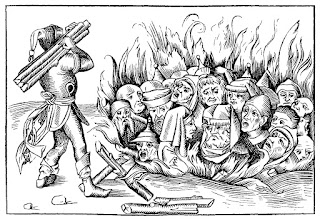Crusader attack in the small commune of Monieux, 1096
1096
Monieux, France
In 1931, a letter was published from the Cairo Geniza which described a medieval pogrom in the French commune of Monieux. In the letter, Yehoshua ben Ovadia testifies about the righteousness of a local convert to Judaism who had a married a Jewish man and resettled in Monieux to avoid detection by her family.
During the first crusade the village was on the route of Raymond of St-Gilles' Provencal army through the Alps. (Norman Golb, The Jews in Medieval Normandy, 127) When the French crusaders entered the town they attacked the Jews. The letter relates that the woman's husband was killed in the synagogue, while two of her children were kidnapped. The impoverished Jewish community could not support her in her plight, so writer was asking that another Jewish community take her in. As it was discovered in Cairo, the assumption is that she had to travel extensively to find a new home. (See also a later article by Norman Golb, in which he considers alternative location to Monieux, but with the same implications.)
This attack, in a small village in the French countryside, is known only from this random letter uncovered in the Geniza. We do not know how many other Jews were killed in the synagogue. Nor is it possible to know how many other small towns were attacked during the crusades (and at other times). This only highlights the likelihood that there have been many instances of synagogue massacres which have been lost to history.
It is also worth noting that even in 1096, the Jew who wrote this letter thought it pertinent to mention that her husband was killed in a synagogue, presumably to try and evoke pity and help the woman find a new community. This may imply that even at that early stage, death in a synagogue held a certain emotional currency among Jews.
Monieux, France
In 1931, a letter was published from the Cairo Geniza which described a medieval pogrom in the French commune of Monieux. In the letter, Yehoshua ben Ovadia testifies about the righteousness of a local convert to Judaism who had a married a Jewish man and resettled in Monieux to avoid detection by her family.
During the first crusade the village was on the route of Raymond of St-Gilles' Provencal army through the Alps. (Norman Golb, The Jews in Medieval Normandy, 127) When the French crusaders entered the town they attacked the Jews. The letter relates that the woman's husband was killed in the synagogue, while two of her children were kidnapped. The impoverished Jewish community could not support her in her plight, so writer was asking that another Jewish community take her in. As it was discovered in Cairo, the assumption is that she had to travel extensively to find a new home. (See also a later article by Norman Golb, in which he considers alternative location to Monieux, but with the same implications.)
This attack, in a small village in the French countryside, is known only from this random letter uncovered in the Geniza. We do not know how many other Jews were killed in the synagogue. Nor is it possible to know how many other small towns were attacked during the crusades (and at other times). This only highlights the likelihood that there have been many instances of synagogue massacres which have been lost to history.
It is also worth noting that even in 1096, the Jew who wrote this letter thought it pertinent to mention that her husband was killed in a synagogue, presumably to try and evoke pity and help the woman find a new community. This may imply that even at that early stage, death in a synagogue held a certain emotional currency among Jews.


Comments
Post a Comment